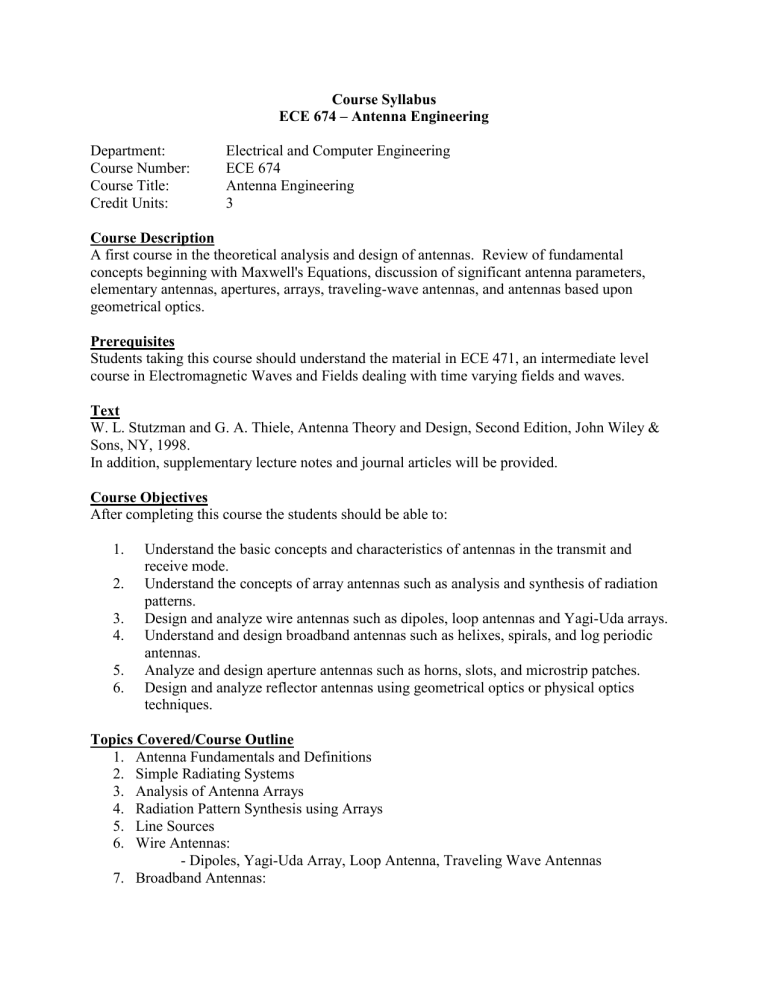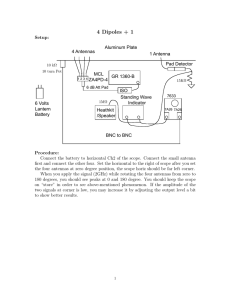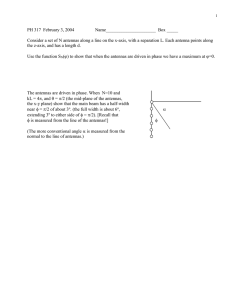ECE 674 (.doc)

Course Syllabus
ECE 674 – Antenna Engineering
Department:
Course Number:
Course Title:
Electrical and Computer Engineering
ECE 674
Antenna Engineering
3 Credit Units:
Course Description
A first course in the theoretical analysis and design of antennas. Review of fundamental concepts beginning with Maxwell's Equations, discussion of significant antenna parameters, elementary antennas, apertures, arrays, traveling-wave antennas, and antennas based upon geometrical optics.
Prerequisites
Students taking this course should understand the material in ECE 471, an intermediate level course in Electromagnetic Waves and Fields dealing with time varying fields and waves.
Text
W. L. Stutzman and G. A. Thiele, Antenna Theory and Design, Second Edition, John Wiley &
Sons, NY, 1998.
In addition, supplementary lecture notes and journal articles will be provided.
Course Objectives
After completing this course the students should be able to:
1.
Understand the basic concepts and characteristics of antennas in the transmit and receive mode.
2.
Understand the concepts of array antennas such as analysis and synthesis of radiation patterns.
3.
Design and analyze wire antennas such as dipoles, loop antennas and Yagi-Uda arrays.
4.
Understand and design broadband antennas such as helixes, spirals, and log periodic antennas.
5.
Analyze and design aperture antennas such as horns, slots, and microstrip patches.
6.
Design and analyze reflector antennas using geometrical optics or physical optics techniques.
Topics Covered/Course Outline
1.
Antenna Fundamentals and Definitions
2.
Simple Radiating Systems
3.
Analysis of Antenna Arrays
4. Radiation Pattern Synthesis using Arrays
5. Line Sources
6. Wire Antennas:
- Dipoles, Yagi-Uda Array, Loop Antenna, Traveling Wave Antennas
7. Broadband Antennas:
- Helix, Biconical Antenna, Spiral Antenna, Log-Periodic Antenna
8. Aperture Antenna:
- Horns, Reflector Antennas
Relationships to Program Outcomes
This course supports the achievement of the following outcomes: a) Ability to apply knowledge of advanced principles to the analysis of electrical and computer engineering problems. b) Ability to apply knowledge of advanced techniques to the design of electrical and computer engineering systems. c) Ability to apply the appropriate industry practices, emerging technologies, state-of-the-art design techniques, software tools, and research methods for solving electrical and computer engineering problems. d) Ability to use the appropriate state-of-the-art engineering references and resources, including IEEE research journals and industry publications, needed to find the best solutions to electrical and computer engineering problems. e) Ability to communicate clearly and use the appropriate medium, including written, oral, and electronic methods. f) Ability to maintain life-long learning and continue to be motivated to learn new subjects. g) Ability to learn new subjects that are required to solve problems in industry without being dependent on a classroom environment. h) Ability to be competitive in the engineering job market or be admitted to an excellent
Ph.D. program.
Prepared by:
Sembiam R. Rengarajan
February 14, 2003

![EEE 443 Antennas for Wireless Communications (3) [S]](http://s3.studylib.net/store/data/008888255_1-6e942a081653d05c33fa53deefb4441a-300x300.png)
